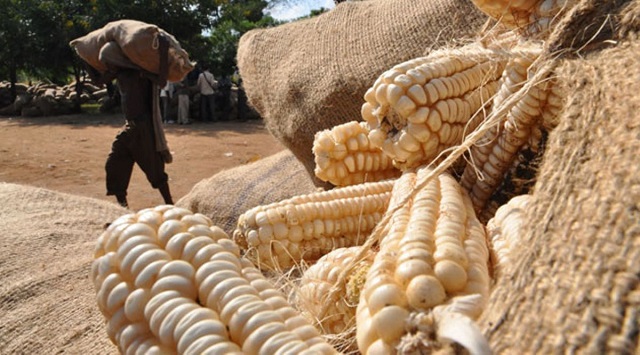
Kampala, Uganda | THE INDEPENDENT | The government has started mobilizing farmers and companies to supply maize grain to Zimbabwe, in response to a request by Zimbabwean President Emmerson Mnangagwa. The move is aimed at averting hunger due to drought and economic challenges in Zimbabwe, once a breadbasket for the rest of southern Africa.
President Mnangagwa made the request through president Yoweri Museveni when they met at the just concluded African Union summit in Addis Ababa, Ethiopia. He has been quoted saying that Zimbabwe had previously endured two consecutive droughts, until all the reserves were drained, leaving up to eight million nationals on the verge of starvation.
A poor harvest in 2014-15, historic drought in 2015-16, and the second-worst cyclone on record in 2019 have taken a toll on Zimbabwe’s agricultural sector, according to the World Food Programme, creating dire consequences for a country whose population entirely depends on rain-fed agriculture.
According to a December 2019 Famine Early Warning Network System (Fewsnet) report about Southern Africa, the October 2019 to March 2020 season started poorly with widespread rainfall deficits, forecasting models anticipate a below-average rainfall through March, including in surplus-producing Zambia and South Africa.
President Mnangagwa is optimistic that supply from Uganda will offset the domestic shortfall of maize corn of about 1 million tons. Zimbabwe’s corn consumption is about 2.2 million tons per year, yet Uganda has at least six million tons of maize with the ability to consume half of it.
Agriculture Minister Vincent Bamulangaki Ssempijja says that a team from Zimbabwe is already here to inspect stores alongside Uganda Grain Council, and assessing the possibility of buying Ugandan grain. Ssempijja advised Ugandans to embrace the deal and venture into grain farming looking at the prospects.
He says several other Southern Africa Countries have expressed interest in buying grain from Uganda.
State Minister for Animal Husbandry Bright Rwamirama says that so far grain companies are working with individual farmers to mobilize grains for export. Without disclosing the quantity needed, Rwamirama says that the government could be at least able to supply half of what they need.
He says the process has now started with mobilization of farmers and grain dealers.
The Food and Agriculture Organisation-FAO has hailed Uganda for its move to export to Zimbabwe, saying there is a need to promote more exports. Antonio Querido the FAO Country Representative says that Uganda is rich in arable land and it can be the food basket again.
Below-average production has also been predicted in Angola, Botswana, Lesotho, Namibia, Zambia and Zimbabwe while South Africa and Mozambique, the region’s largest maize grain producer, are likely to produce average to below-average agricultural production.
******
URN
 The Independent Uganda: You get the Truth we Pay the Price
The Independent Uganda: You get the Truth we Pay the Price


